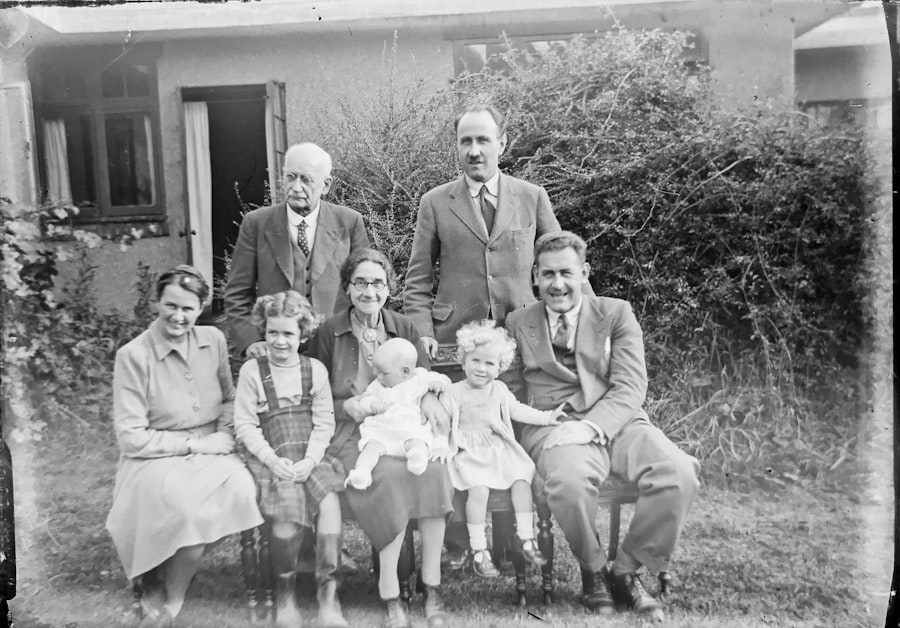Emotional inheritance refers to the transmission of emotional patterns, beliefs, and behaviors from one generation to the next. It is a complex interplay of experiences, traumas, and learned responses that shape how we perceive and interact with the world around us. I often find myself reflecting on how my upbringing has influenced my emotional responses and relationships.
Just as physical traits can be passed down through DNA, so too can emotional legacies be inherited through familial connections. This inheritance can manifest in various ways, from the way we handle stress to how we express love and affection. In essence, emotional inheritance encompasses both the positive and negative aspects of our emotional lives.
It can include resilience, empathy, and love, but it can also carry burdens such as anxiety, fear, and unresolved trauma. I have come to realize that understanding this concept is crucial for personal growth. By recognizing the emotional patterns that I have inherited, I can begin to untangle the complexities of my emotional landscape and work towards healthier relationships and a more fulfilling life.
Key Takeaways
- Emotional inheritance refers to the passing down of emotional traits and patterns from one generation to another.
- Emotional inheritance can have a significant impact on relationships, influencing communication, trust, and conflict resolution.
- Family dynamics play a crucial role in shaping emotional inheritance, as patterns and behaviors are often learned within the family unit.
- Love has the power to shape emotional inheritance positively, providing a foundation of security and resilience.
- Recognizing and addressing negative emotional inheritance is essential for breaking the cycle and building a legacy of love and resilience for future generations.
The Impact of Emotional Inheritance on Relationships
The impact of emotional inheritance on relationships is profound and often subtle. I have observed how my family dynamics have shaped my interactions with others, influencing everything from my communication style to my ability to trust. For instance, if I grew up in an environment where emotions were suppressed or dismissed, I might struggle to express my feelings openly in my adult relationships.
This can lead to misunderstandings and conflicts that stem from unaddressed emotional needs. Moreover, emotional inheritance can create patterns that repeat across generations. I have seen this in my own life, where certain relational dynamics seem to echo those of my parents or grandparents.
For example, if I witnessed unhealthy conflict resolution in my family, I might unconsciously replicate those behaviors in my own relationships. Recognizing these patterns has been a crucial step for me in breaking free from cycles that no longer serve me. By understanding how emotional inheritance shapes my interactions, I can consciously choose to foster healthier connections with those around me.
Understanding the Role of Family Dynamics in Emotional Inheritance

Family dynamics play a pivotal role in shaping emotional inheritance. The way family members interact with one another creates a unique emotional environment that influences individual development. I have often reflected on how my family’s communication styles and conflict resolution methods have impacted my own approach to relationships.
For instance, if open dialogue was encouraged in my household, I tend to feel more comfortable discussing my feelings with others. Conversely, if silence or avoidance was the norm, I might find it challenging to engage in meaningful conversations. Additionally, the roles assigned within a family can significantly affect emotional inheritance.
I have noticed how being labeled as “the peacemaker” or “the rebel” can dictate one’s emotional responses and coping mechanisms. These roles often become ingrained over time, leading to a cycle of behavior that is difficult to break. Understanding these dynamics has allowed me to recognize the influence of my family on my emotional landscape and has motivated me to redefine my role in relationships.
The Power of Love in Shaping Emotional Inheritance
| Emotional Inheritance Factor | Impact |
|---|---|
| Parental Love | Strongly influences emotional development |
| Attachment Style | Shaped by early experiences of love |
| Empathy and Compassion | Linked to childhood experiences of love |
| Resilience | Can be influenced by a loving upbringing |
Love is a powerful force that shapes emotional inheritance in profound ways. I have experienced firsthand how unconditional love from family members can foster resilience and emotional well-being. When I think back to moments of support and encouragement from my loved ones, I realize how these experiences have instilled a sense of security within me.
This foundation of love has enabled me to approach challenges with a positive mindset and has influenced how I express affection towards others. However, love can also be complicated by expectations and conditionality.
This complexity highlights the dual nature of love in emotional inheritance; while it can nurture growth and resilience, it can also create burdens that need to be addressed. By acknowledging both the positive and negative aspects of love within my family dynamics, I can work towards cultivating healthier relationships based on mutual understanding and acceptance.
Overcoming Adversity: Resilience in the Face of Emotional Inheritance
Resilience is a key factor in overcoming the challenges posed by emotional inheritance. Throughout my life, I have faced various adversities that stem from inherited emotional patterns. However, I have also discovered that resilience is not merely an innate trait but a skill that can be developed over time.
By confronting the emotional legacies passed down to me, I have learned to navigate difficulties with greater strength and adaptability. One significant aspect of building resilience is the ability to reframe negative experiences as opportunities for growth. I have found that when I view challenges through this lens, I am better equipped to cope with stress and adversity.
This shift in perspective allows me to break free from the limitations imposed by my emotional inheritance and empowers me to create a more positive narrative for myself. Embracing resilience has become a vital part of my journey toward healing and self-discovery.
Breaking the Cycle: Healing from Negative Emotional Inheritance

Breaking the cycle of negative emotional inheritance requires intentional effort and self-awareness. I have come to understand that healing is not a linear process; it involves confronting uncomfortable truths about myself and my family history. Acknowledging the negative patterns that have been passed down is the first step toward creating change.
For me, this has meant reflecting on past experiences and recognizing how they continue to influence my present. In this journey of healing, I have found it essential to cultivate self-compassion. Instead of blaming myself for inherited emotional struggles, I remind myself that these patterns are not my fault but rather a product of my environment.
By practicing self-compassion, I create space for growth and transformation.
The Science Behind Emotional Inheritance
The science behind emotional inheritance is rooted in psychology and neuroscience, revealing how our experiences shape our emotional responses at a biological level. Research indicates that early childhood experiences significantly impact brain development and emotional regulation. I find it fascinating how our brains are wired to respond to our environments, creating neural pathways that influence our behavior throughout life.
Moreover, studies suggest that trauma can be passed down through generations via epigenetic changes—alterations in gene expression caused by environmental factors rather than changes in DNA sequence itself. This means that the emotional struggles faced by previous generations can leave a lasting imprint on subsequent ones. Understanding this scientific perspective has deepened my appreciation for the complexities of emotional inheritance and reinforced the importance of addressing these issues for future generations.
Nurturing Emotional Intelligence in Children to Offset Negative Inheritance
Nurturing emotional intelligence in children is crucial for offsetting negative emotional inheritance. As someone who values personal growth, I recognize the importance of equipping the next generation with the tools they need to navigate their emotions effectively. Teaching children about emotions—how to identify them, express them, and manage them—can create a foundation for healthier relationships and resilience.
In my own experience, fostering open communication about feelings has been transformative. Encouraging children to articulate their emotions helps them develop self-awareness and empathy towards others. By modeling healthy emotional expression and conflict resolution strategies, I aim to break the cycle of negative inheritance and create a legacy of emotional intelligence for future generations.
How to Recognize and Address Emotional Inheritance in Your Own Life
Recognizing and addressing emotional inheritance in my own life has been an enlightening journey. The first step for me was developing self-awareness—taking time to reflect on my emotions and behaviors in various situations. Journaling has been an invaluable tool in this process; it allows me to explore patterns in my thoughts and feelings while identifying triggers rooted in my family history.
Once I became aware of these patterns, addressing them required honesty and vulnerability. I had to confront uncomfortable truths about myself and my upbringing while being gentle with myself during this process. Engaging in open conversations with family members about our shared experiences has also provided valuable insights into our collective emotional inheritance, allowing us to support one another in breaking free from negative cycles.
Seeking Professional Help: Therapy and Counseling for Emotional Inheritance
Seeking professional help through therapy or counseling has been instrumental in navigating the complexities of emotional inheritance. Working with a therapist has provided me with a safe space to explore my feelings and gain deeper insights into how my family history influences my current relationships. Through various therapeutic modalities—such as cognitive-behavioral therapy or family systems therapy—I have learned effective strategies for addressing inherited emotional patterns.
Therapy has also equipped me with tools for managing stress and anxiety related to these inherited emotions. By developing coping mechanisms tailored to my unique experiences, I feel more empowered to confront challenges head-on rather than allowing them to dictate my behavior or relationships.
The Future of Emotional Inheritance: Building a Legacy of Love and Resilience
As I look toward the future, I am hopeful about building a legacy of love and resilience for myself and future generations. By actively addressing the emotional patterns inherited from my family, I am taking steps toward creating a healthier environment for those around me. This journey involves not only breaking free from negative cycles but also intentionally fostering positive emotional legacies rooted in love, empathy, and understanding.
I envision a future where open communication about emotions is normalized within families—a future where children are equipped with the tools they need to navigate their feelings effectively. By prioritizing emotional intelligence and resilience, we can create a ripple effect that extends beyond our immediate families, ultimately contributing to a more compassionate society as a whole. Through this commitment to healing and growth, I believe we can transform our emotional inheritance into a legacy that uplifts rather than burdens future generations.
In exploring the profound themes of emotional inheritance, one might find a compelling parallel in the article available on the website “Am I Wrong Here.” This piece delves into the intricate ways in which familial emotions and experiences are passed down through generations, shaping individual identities and relationships. For those interested in further understanding these dynamics, the article on this topic can be accessed through this link. It offers a thoughtful examination of how emotional legacies influence our lives, echoing the core ideas presented in the emotional inheritance story.
WATCH THIS! 🤯He Said I’m Not Family So I Took His Inheritance: The Ultimate Karma Twist
FAQs
What is emotional inheritance?
Emotional inheritance refers to the passing down of emotional traits, patterns, and behaviors from one generation to another within a family. This can include both positive and negative emotional patterns.
What are some examples of emotional inheritance?
Examples of emotional inheritance can include traits such as resilience, empathy, anxiety, depression, and communication patterns. These traits can be passed down through observation, learned behavior, and genetic factors.
How does emotional inheritance impact individuals?
Emotional inheritance can impact individuals by shaping their emotional responses, coping mechanisms, and relationship dynamics. It can also influence how individuals perceive and navigate the world around them.
Can emotional inheritance be changed or altered?
While emotional inheritance can have a strong influence, it is not set in stone. Through self-awareness, therapy, and intentional efforts, individuals can work to change and alter their emotional inheritance patterns.
What role does storytelling play in emotional inheritance?
Storytelling can be a powerful tool for understanding and processing emotional inheritance. Sharing family stories and experiences can help individuals make sense of their emotional patterns and begin to create new narratives for themselves.




